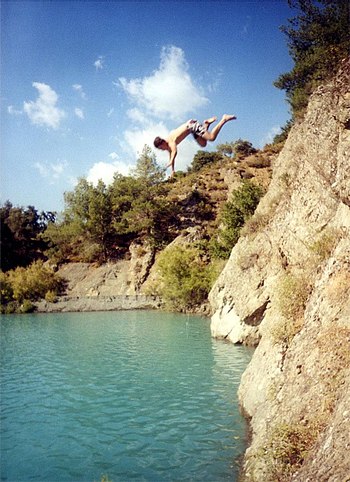
Imagine, you’re standing at the edge of a cliff. Thirty feet below you see your reflection gazing back up at you as the waves lazily roll by, distorting your image far below. You are close enough to the edge to feel the cool breeze kiss your cheeks and your toes feel the rocky edge as they curl towards the abyss below. You can hear your friends call up to you, egging you over the edge, and you imagine the cool touch of the water hug you as you plunge in, leaving the sun that beats against your back behind. You lean forward, your stomach filling up your throat. Your head starts rushing, and you are surprisingly more focused than you can ever remember being. Then, suddenly, you’re flying. Your body senses explode as you fly through the air, and you can feel the crisp mountain air with every nerve of your body until you hit the surface, splashing down among your friends below.
That funny feeling that makes your stomach sit at the back of your throat, or that makes you feel like you couldn’t be more awake or aware – that’s adrenaline. Adrenaline is classified as a hormone, which is produced in a specific spot in your adrenal glands called the medulla. When your brain senses acute danger, it sends nerve signals to specific nerves nestled against your adrenal glands, which cause the creation and expulsion of extra adrenaline. From there, it is directly pumped into your bloodstream, where it is quickly carried to the rest of your body at the speed of your heart, which is about 75 beats per minute.
The adrenaline boost causes your heart rate and blood pressure to skyrocket, while simultaneously causing your pupils to dilate, your airways to expand and kicking your arteries and metabolism into gear as blood and glucose rush to your muscles and brain to kick start them into high alert.
This process is rapid, happening over the course of two to three minutes until the full effect has taken place, which is why your heart beat takes a bit to slow down after cliff-diving or any other potentially stressful situation. Now remember, this is only for acute, immediate stressful encounters; long-term and ongoing stress is a totally different cycle.
The purpose of this reaction is to prepare your body for the fight or flight sequence, in which your body can get away or fight off a predator or life-risking situation. The heightened blood and sugar flow provides extra fuel for your body to burn in case it needs it. Your pupils dilate so you can take more light in and be better prepared for the situation, and your lungs provide the brain with more oxygen to allow it focus.
Your body doesn’t know that you’re jumping off the cliff for fun, for all it knows, you just fell to your doom, so it often sets off the fight or flight sequence even when you aren’t in a sudden-death situation. Adrenaline often flares up with any sudden action that your subconscious wasn’t expecting, causing the feelings of fright after a jump scare in your favorite horror film, or when you trip and feel your chest clench up right before you catch yourself. It can also be set off when your brain feels you are threatened, anxious, or stressed, which can be often for most college students. In situations as minor as preparing for public speeches, or walking into that test you’ve sweated over all week, your brain might think that your stress-overload is a sign of danger, which can also often lead people to have panic attacks. However, many people seek out that feeling, participating in daring and extreme activities for a taste of that rush, and to feel more alive than they ever have before.
So next time you speed down a mountain with nothing but a board beneath you, or cling to the rocky edge of a cliff with nothing but a rope to save you, or maybe even feel like you’re going to throw up right before your midterm is passed out, remember to thank your body. It’s just trying to do keep you alive through tomorrow.
Article produced by College Avenue Magazine.




